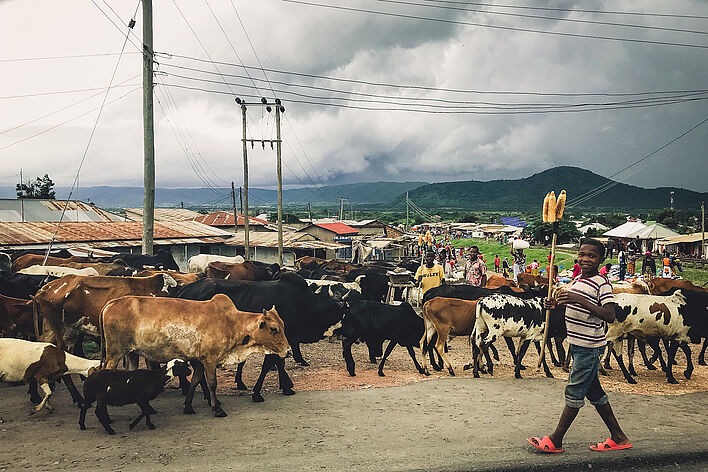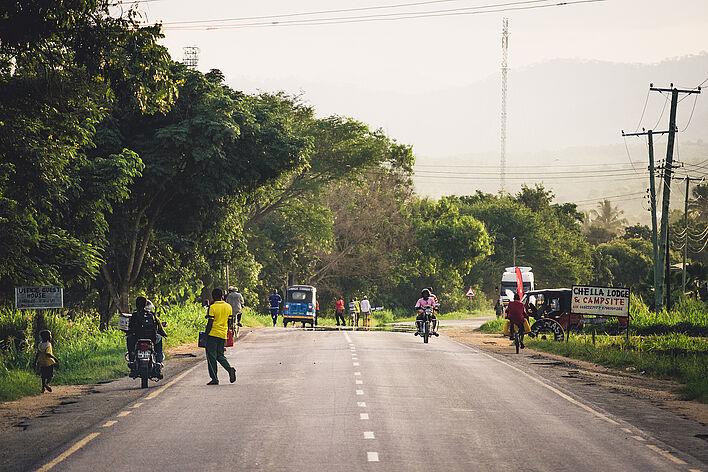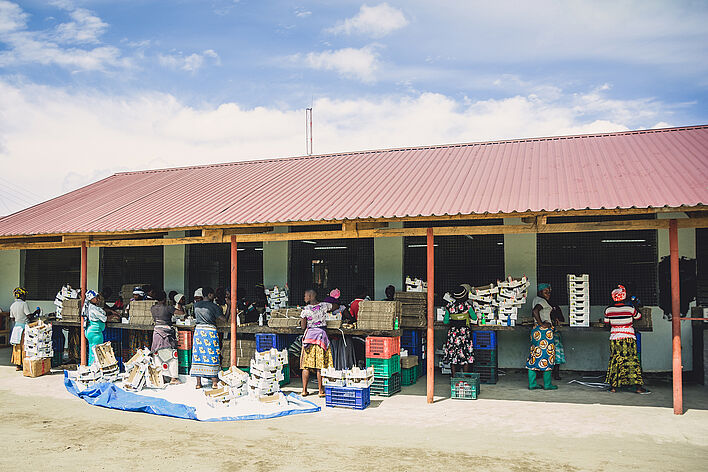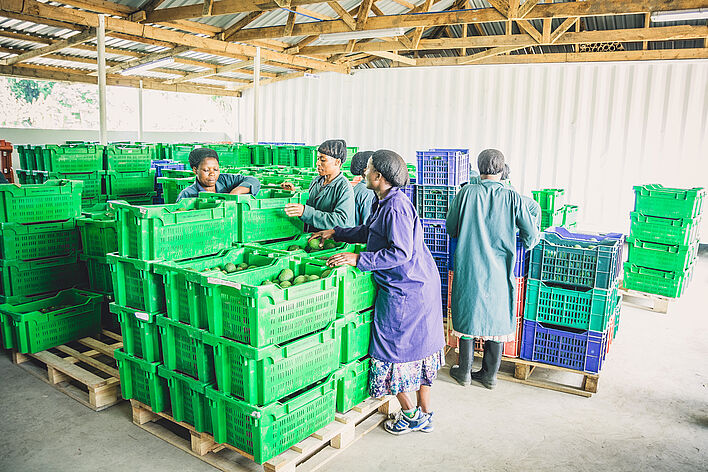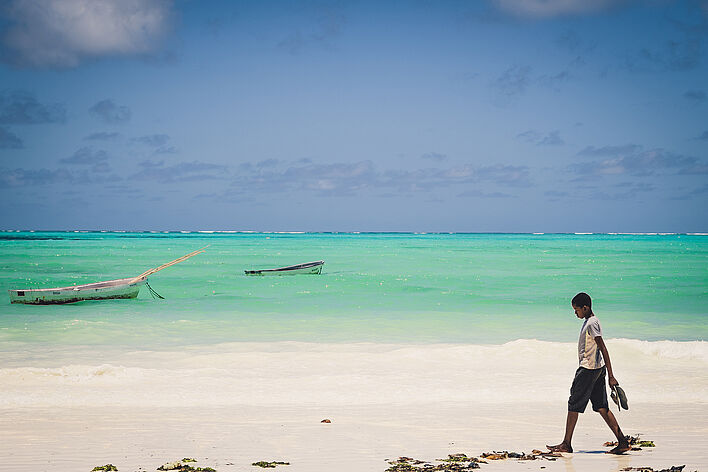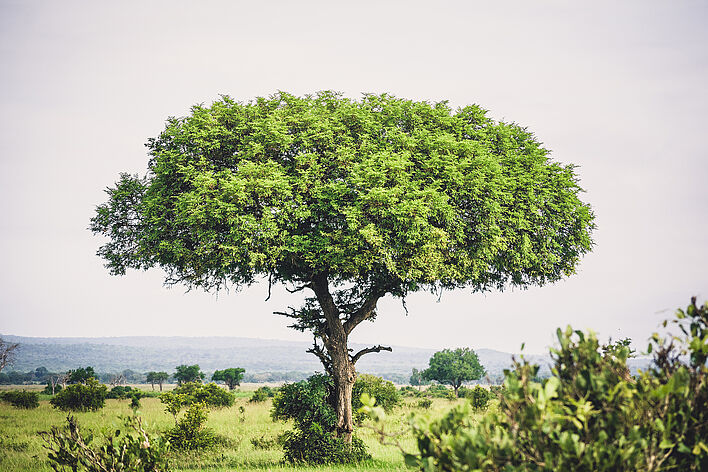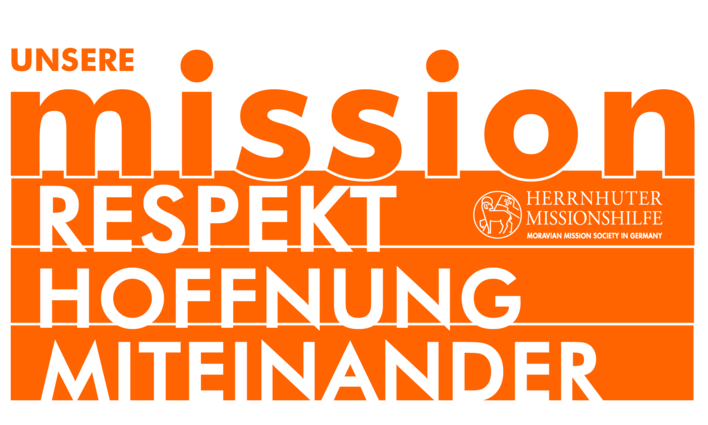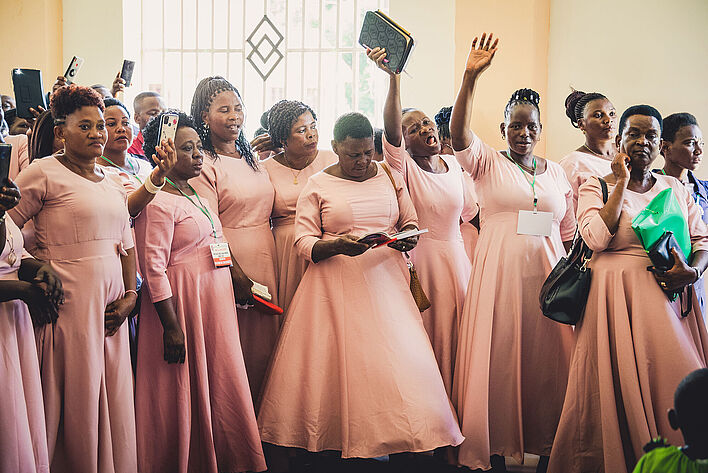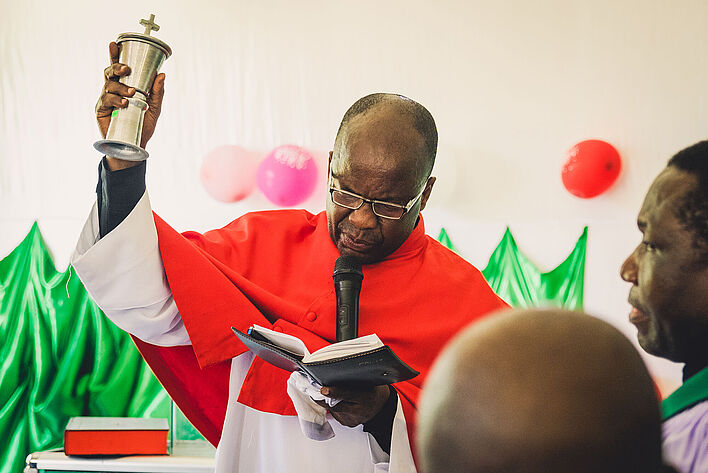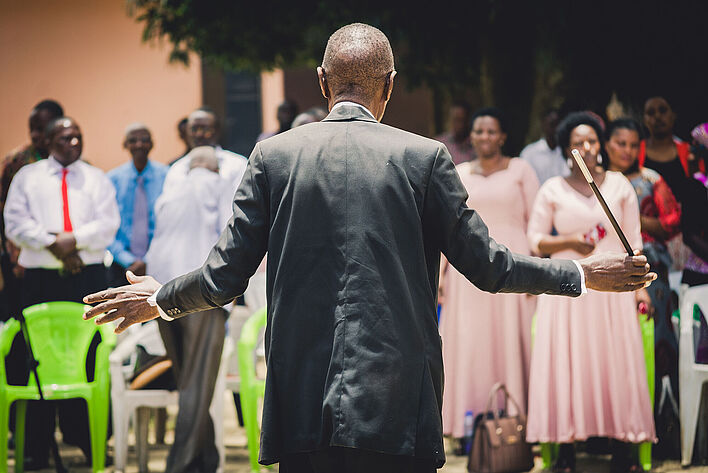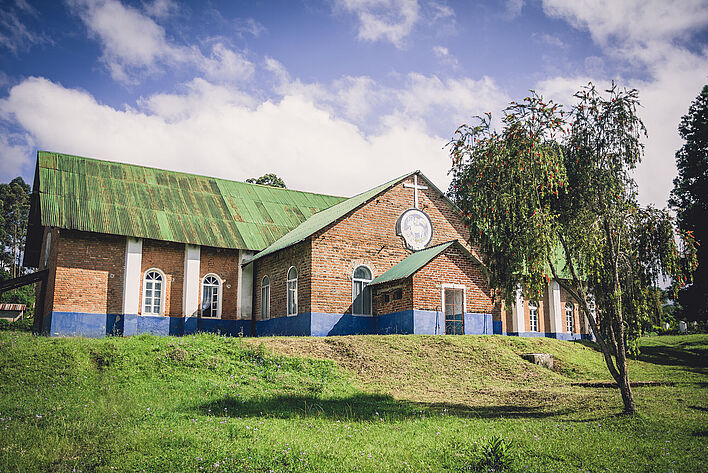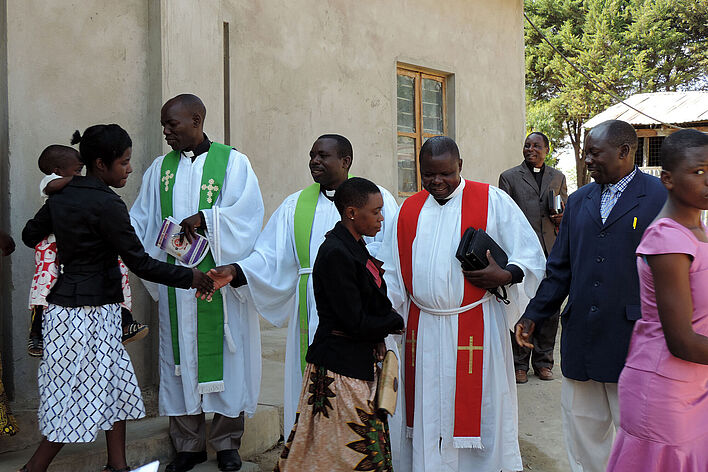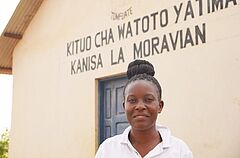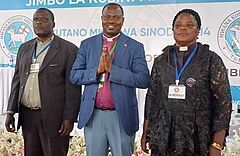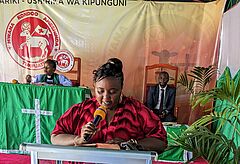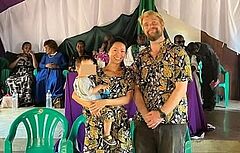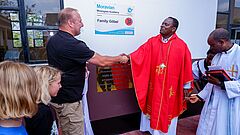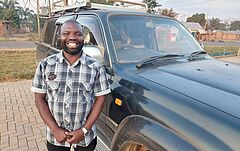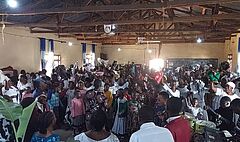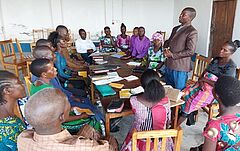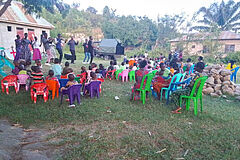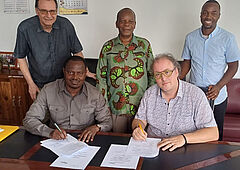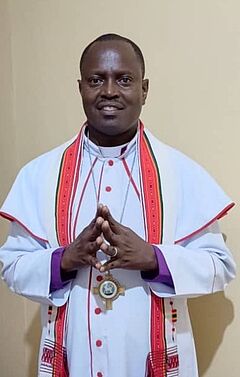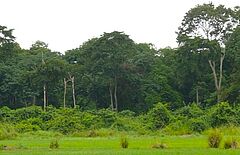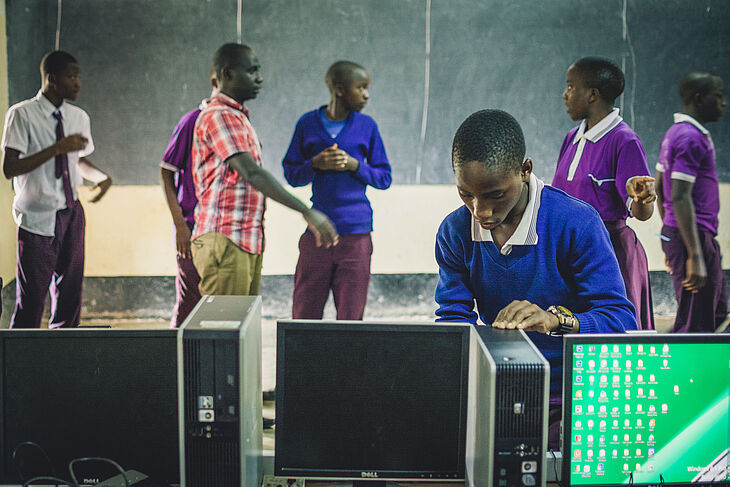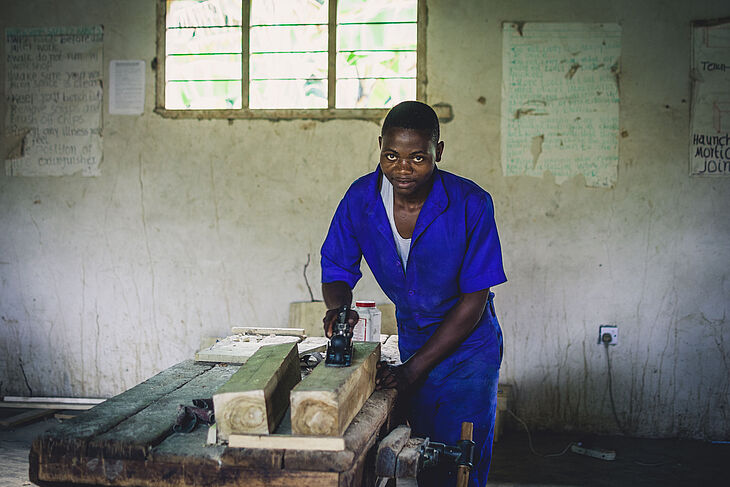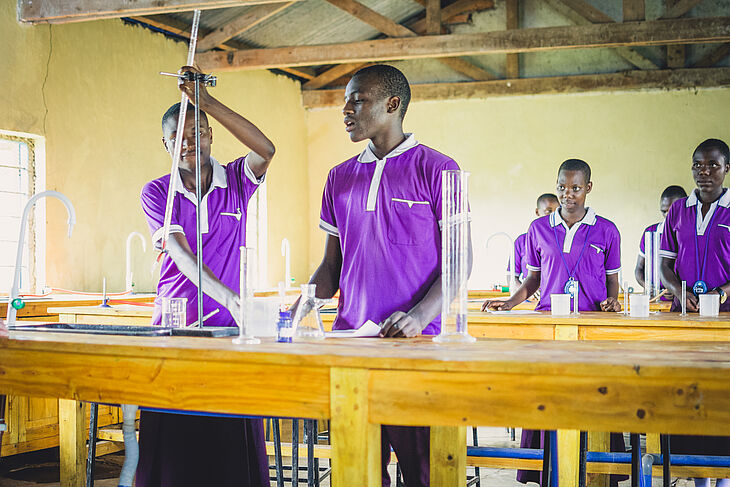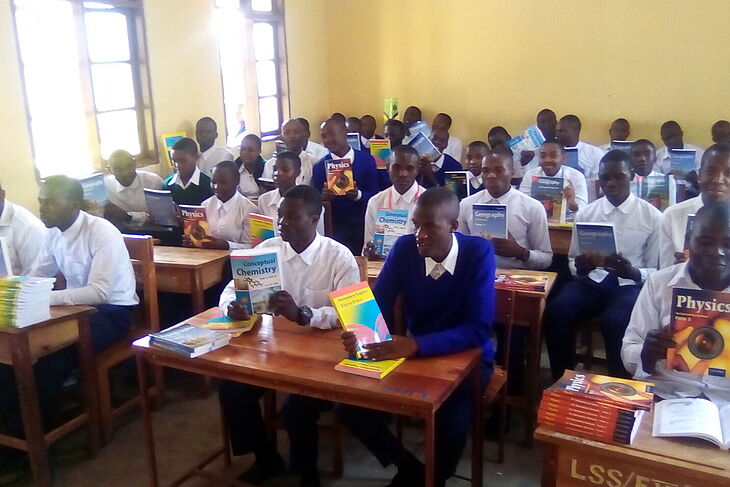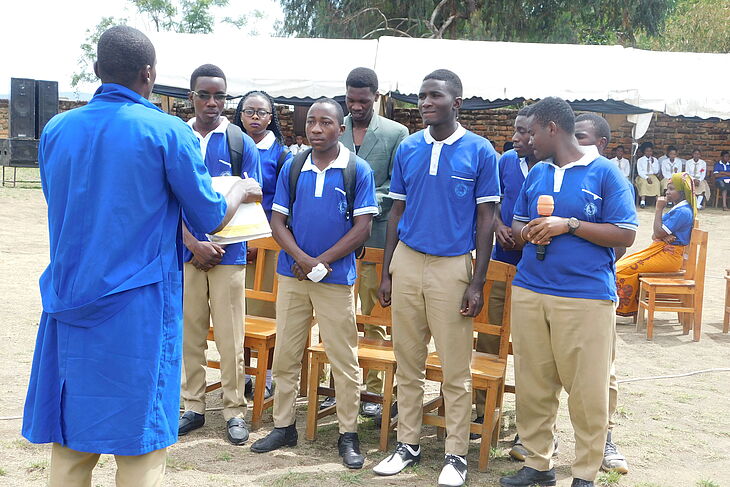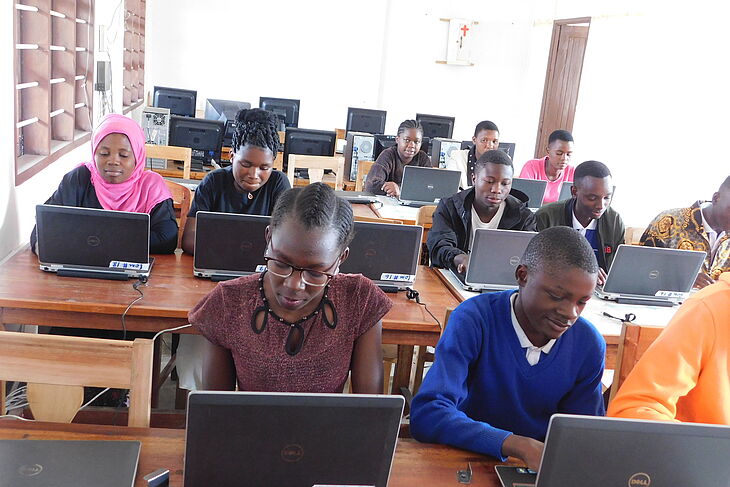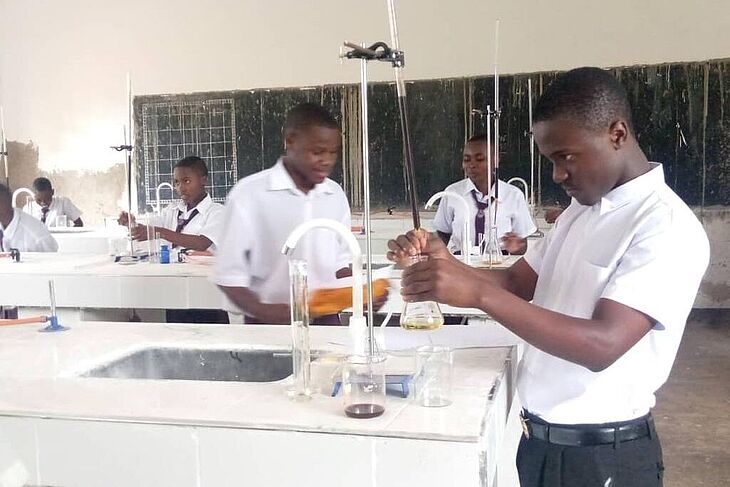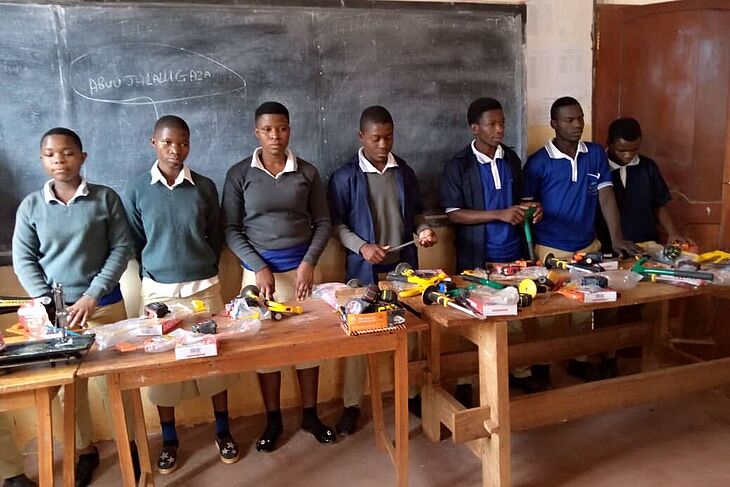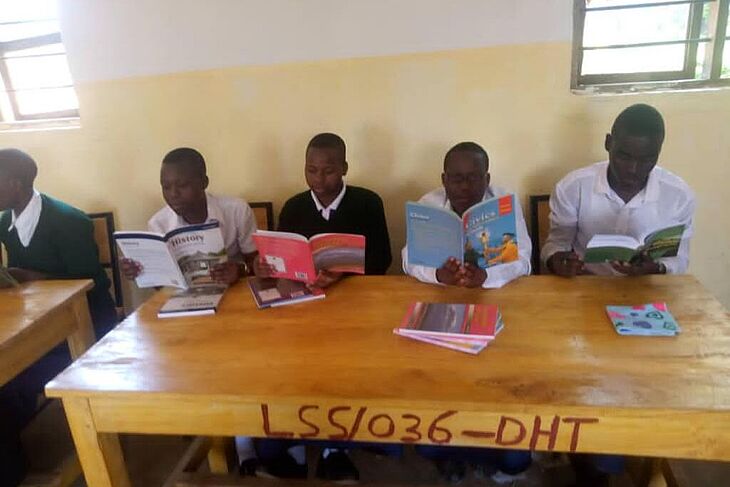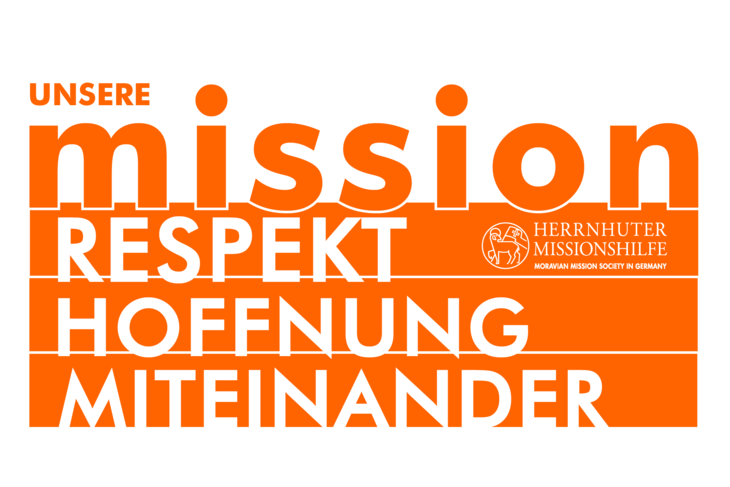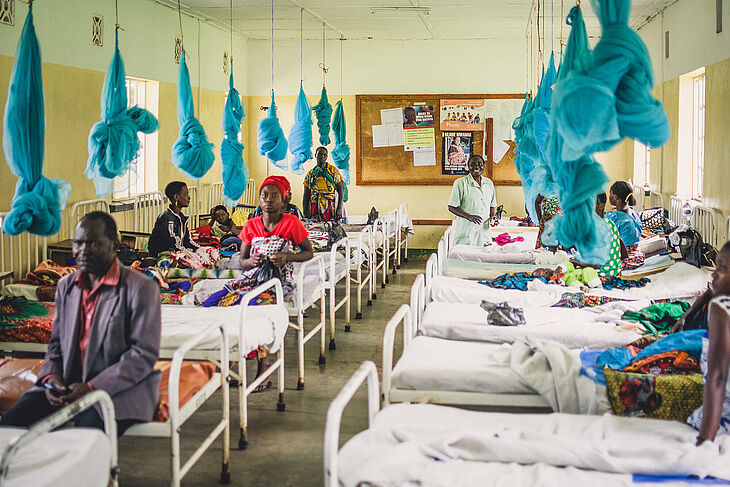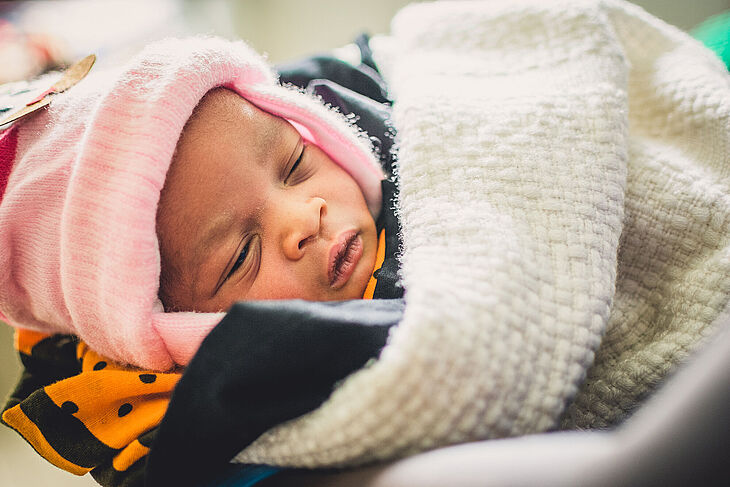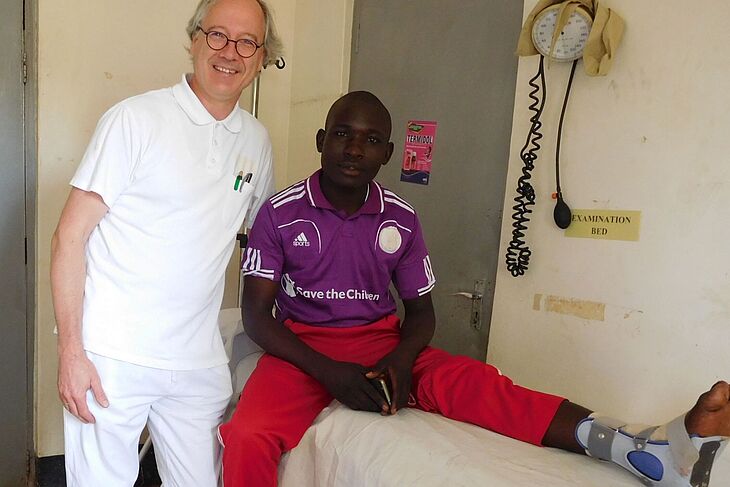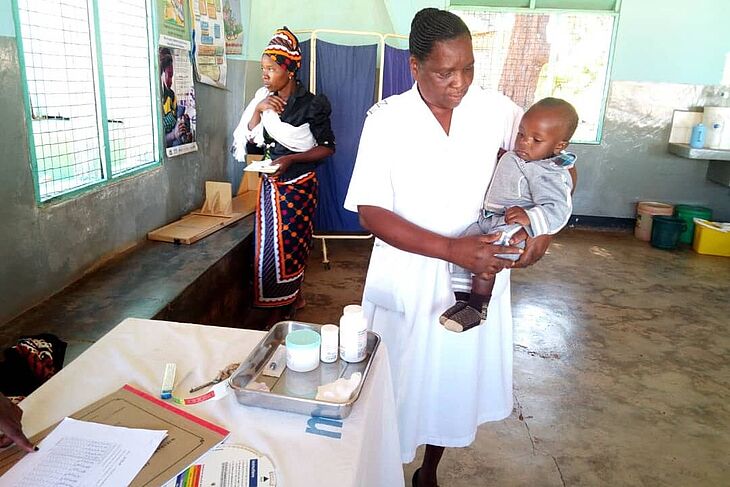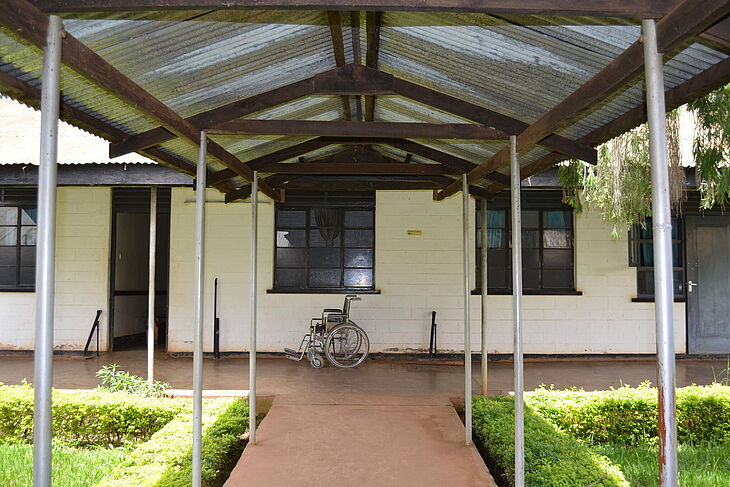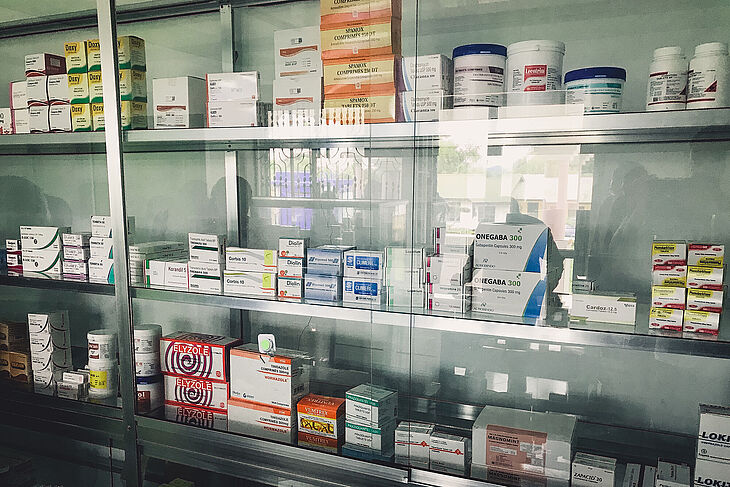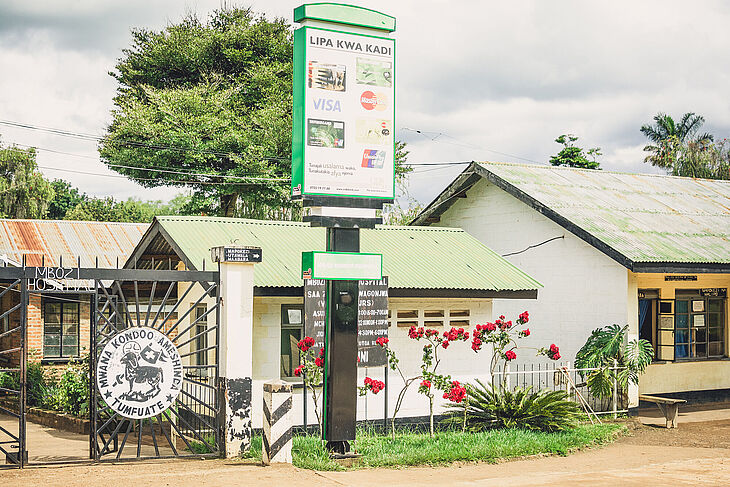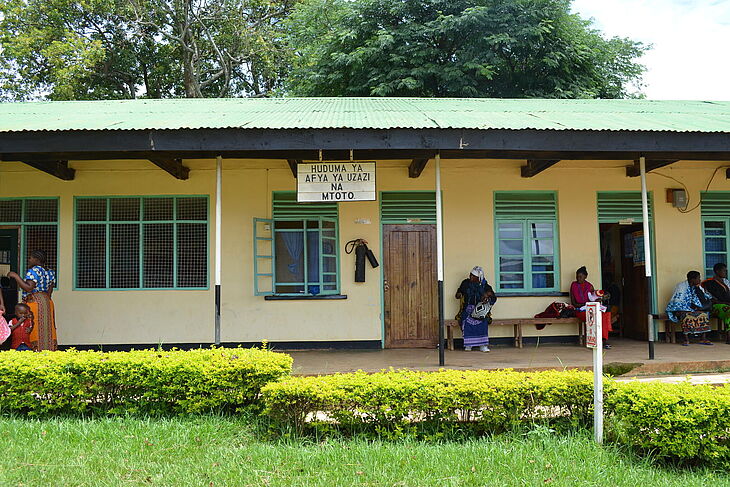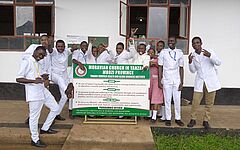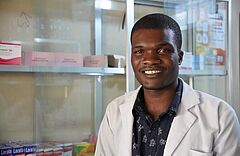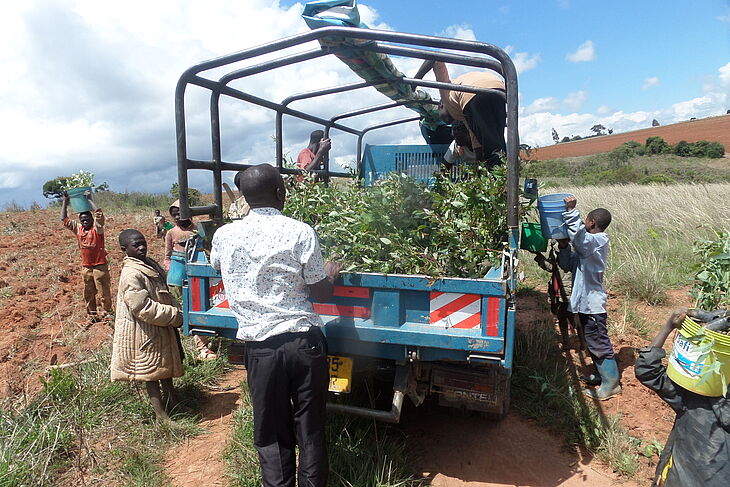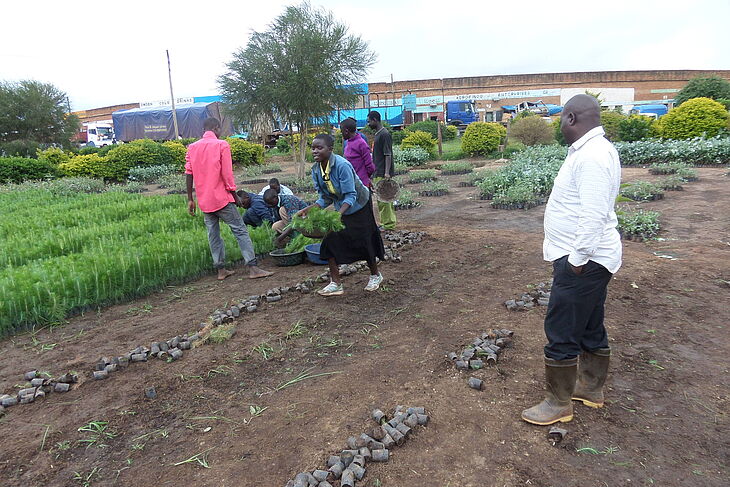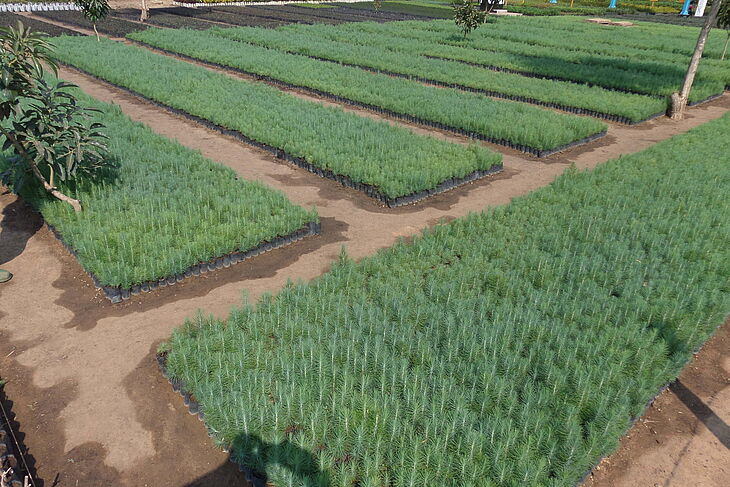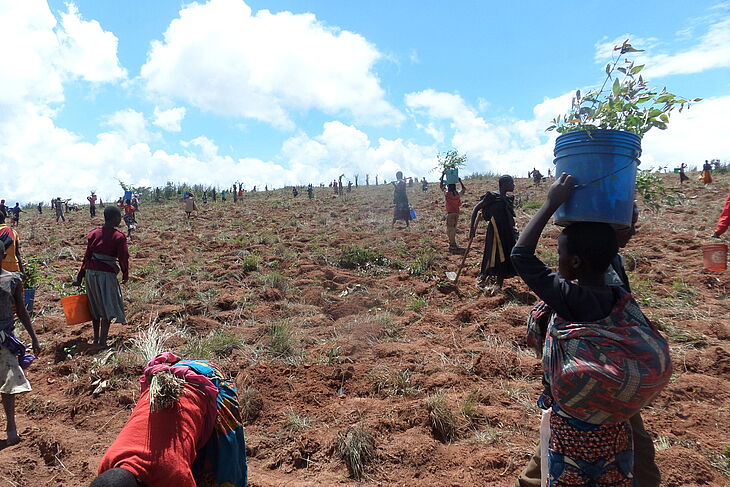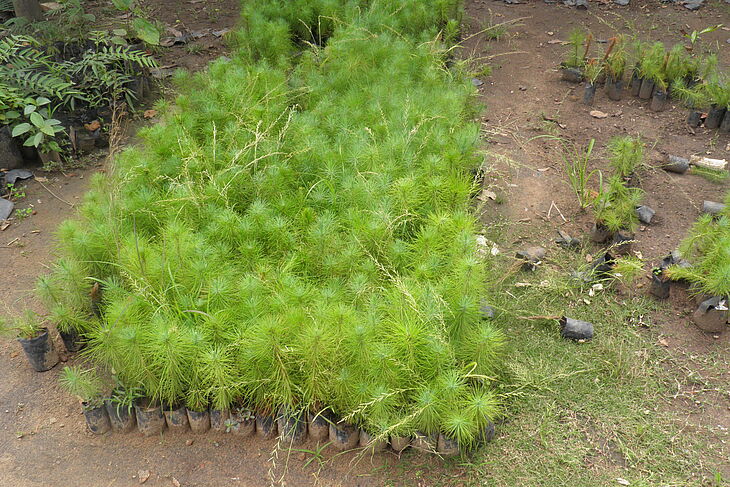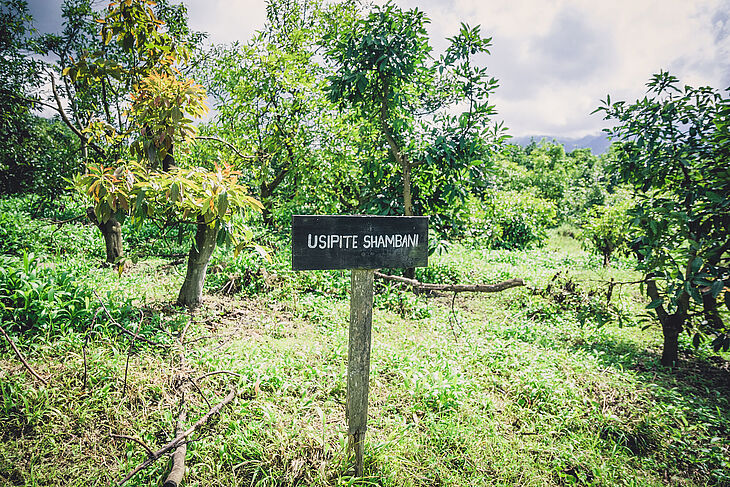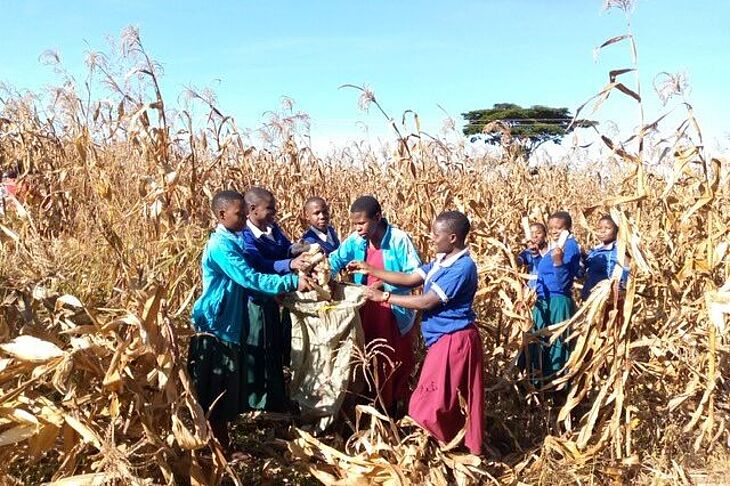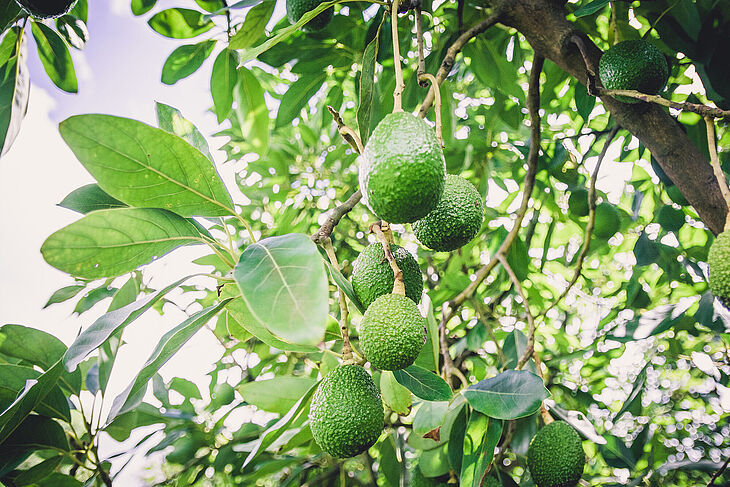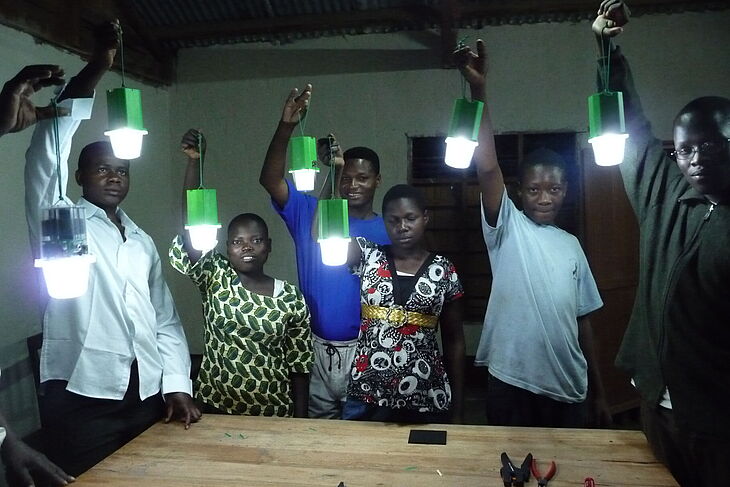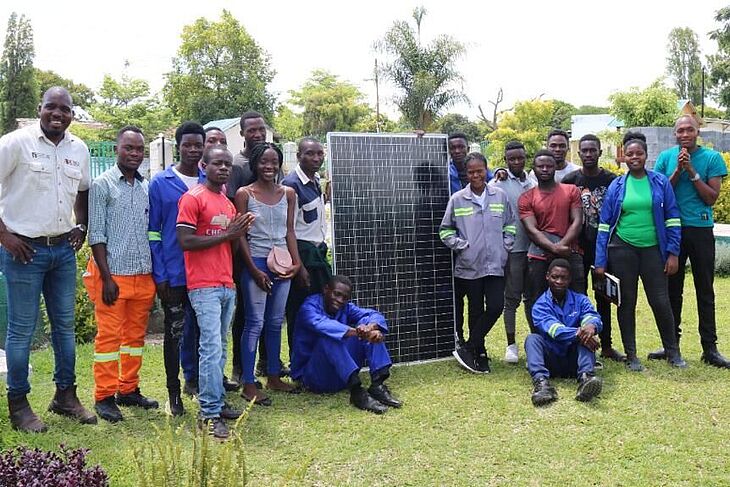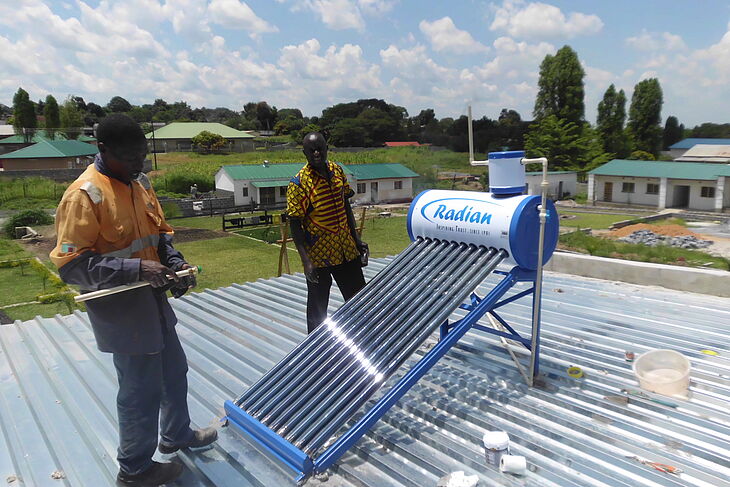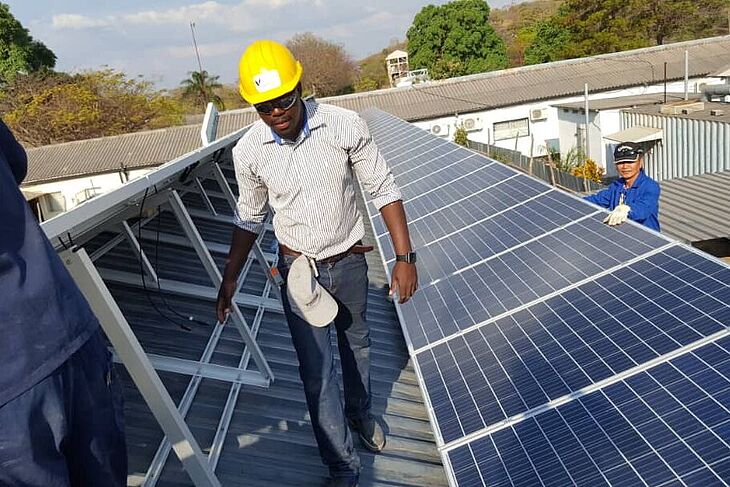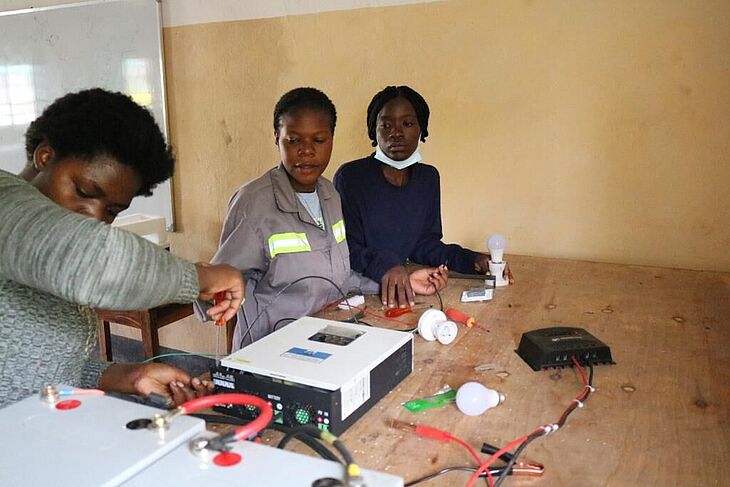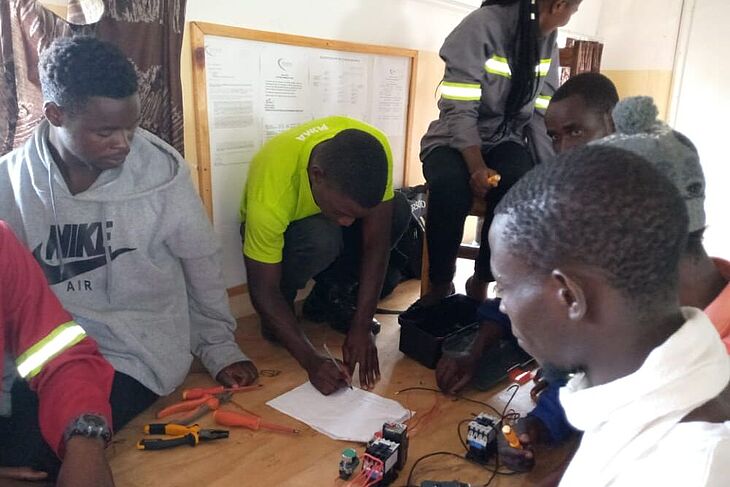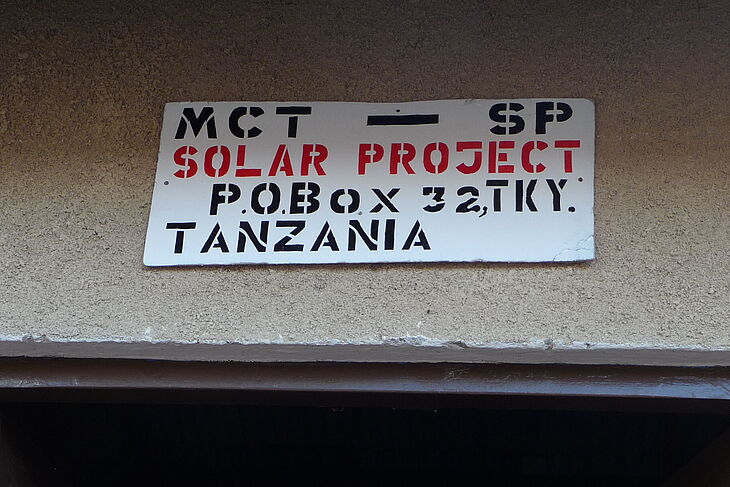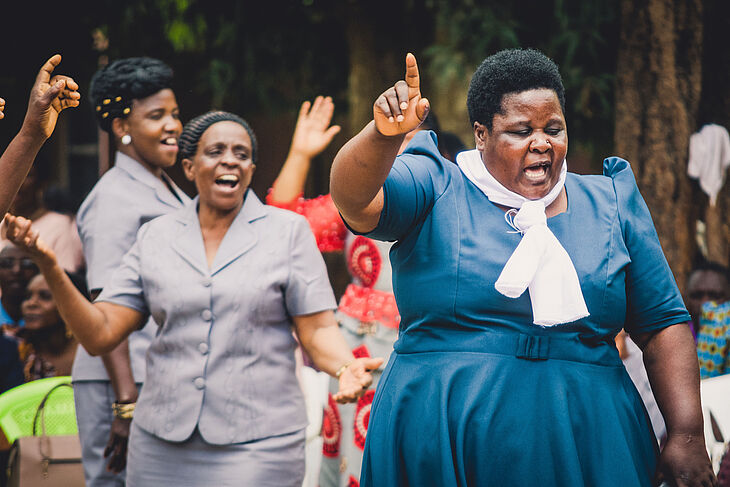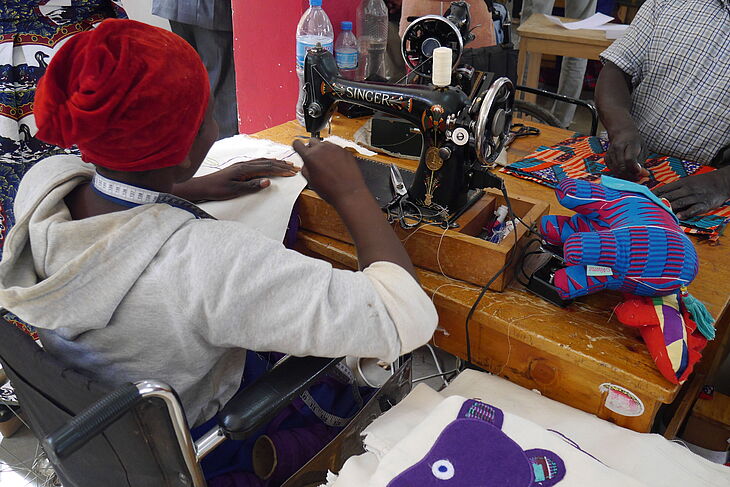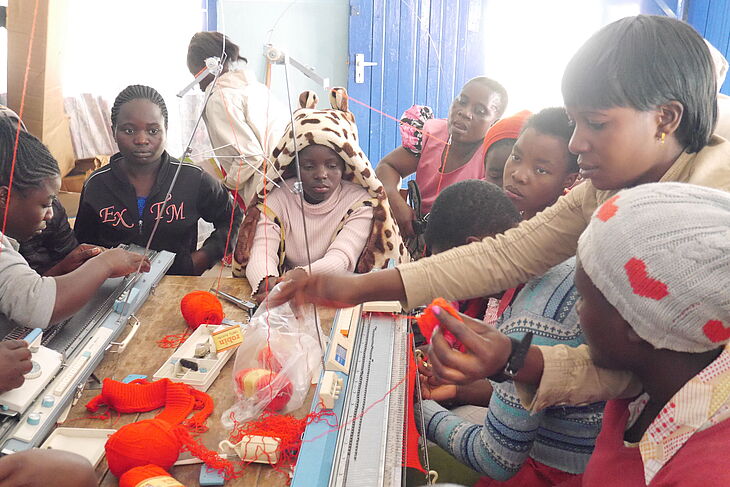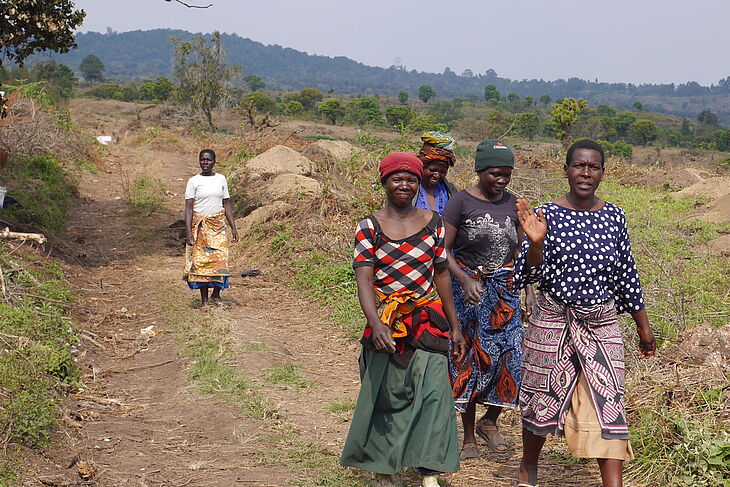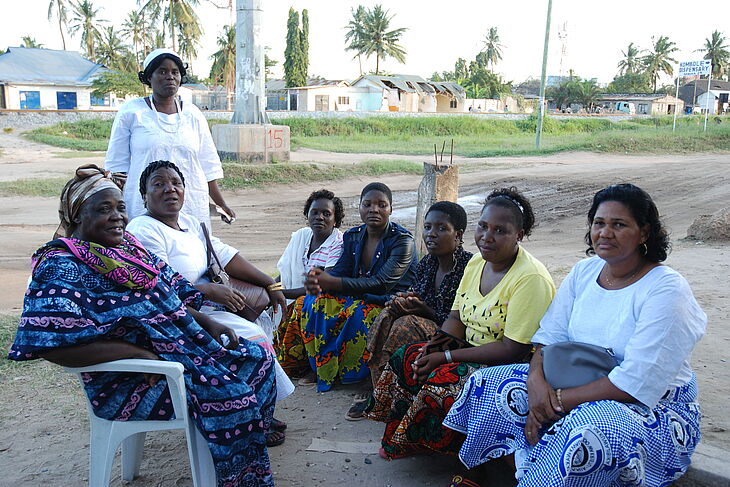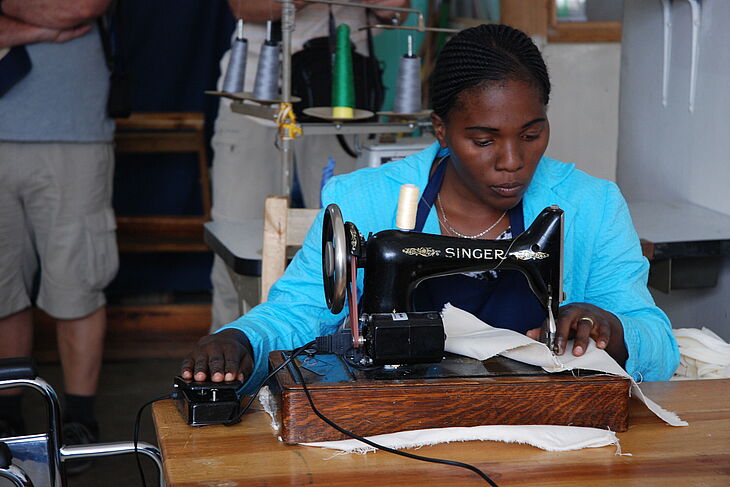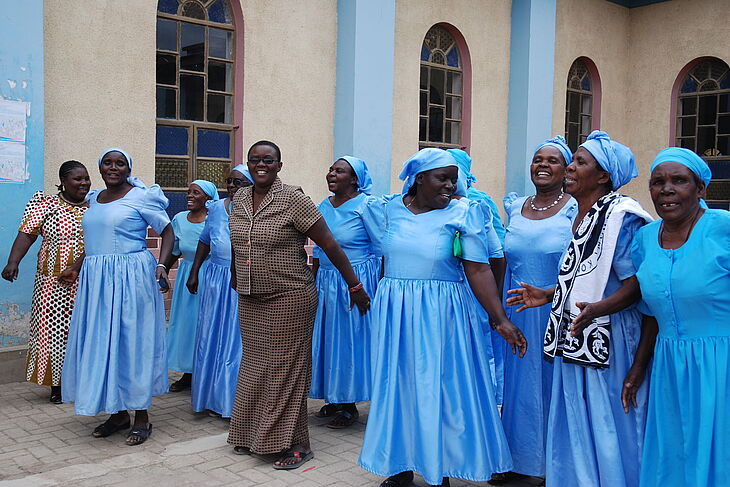Tanzania






Tanzania
The United Republic of Tanzania is a union state on the Indian Ocean founded on April 26, 1964, and an amalgamation of Tanganyika and the islands of Zanzibar. The new state name was created from the first three letters of Tanganyika, the first two letters of Zanzibar and the last three letters of Azania, the former Greek term for the coast of East Africa. Tanzania, which is one of the poorest countries in the world, is an agricultural country with little industrialization. Currently, about 67% of Tanzanians live below the international poverty line, meaning they have less than $1.25 per day to live on.
Tanzania's population is growing very rapidly, with the average age of the Tanzanian population at 17 years and life expectancy at 61 years.
The population of Tanzania belongs to about 130 different ethnic groups. The majority belongs to the Bantu, the Maasai form their own ethnic group, which makes up no more than 3% of the total population. In addition to this traditional African population, Tanzania is also home to minorities from India, Pakistan, the Arab region and Europe. Over 125 different languages are spoken in Tanzania. The most common language is (Ki-)Swahili, which is also the official language. Only in Tanzania and Ethiopia does a traditional African language have the status of official language. Tanzanians are very proud of this achievement, and attachment to their language is strong. English is widely spoken, especially in urban areas, and has the status of a language of communication and education.
It is estimated that about 40% of the people in Tanzania are Christians, the same number are Muslims, and about 20% are followers of traditional African religions. Islam was the first religion to be transmitted by Arab traders to what is now Tanzania, especially to the coastal region and islands, starting in the 8th century. To this day, therefore, the majority of the coastal inhabitants are of the Muslim faith. Tanzania is considered a model of peaceful coexistence of different religions and cultures and a stable island in the conflict-ridden East African environment. Tanzania is considered one of the safest countries in Africa. Relatively stable democratic conditions and a functioning judicial and administrative system have ensured peaceful coexistence in the country for years.
The official capital is Dodoma (population approx. 0.8 million); the de facto seat of government and economic center is Dar es Salaam (population approx. 4.3 million). The 38 million people live in an area of about 945,000 km², which includes the 2,643 km² Zanzibar archipelago. This makes Tanzania the largest country in the east of the African continent and, in comparison, two and a half times the size of Germany. The capital of the state is Dodoma, but the seat of government and also the largest city is Dar es Salaam.
Moravian Church in Tanzania
The Moravian Church in Tanzania MCT, called Kanisa La Moravian Tanzania in the local language, was founded in 1891 from the mission station in Rungwe in southern Tanzania. The MCT has about 800,000 members, which is 70% of the worldwide Moravian Church.
The MCT, as it is called in English, is divided into eight Unity provinces (church headquarters): Western Province (Tabora), Southern Province (Rungwe), Southwestern Province (Mbeya), Mbozi Province(Mbozi), Rukwa Province (Sumbawanga), Lake Tanganyika Province (Kigoma), Northern Province (Arusha) and Eastern Province (Dar es Salam). There are also the Mission Provinces Iringa and Ruvuma and the Mission Areas South Central and Lake Victora.
The MCT coordinates and oversees the development and growth of the theological college, which since 2004 has been called Bishop Kisanji University. It is responsible for the publication of hymnals, liturgical and textbooks, and other church literature published by the Moravian Theological Commission. It represents the provinces to the government, other churches, authorities and ecumenical organizations. Its main task is to proclaim the Gospel in word and deed through the provinces, both inside and outside the Church. The church in Tanzania is growing and the number of members is increasing rapidly. Each province has a specific area for evangelization. Each province is also involved outside the country's borders in the Democratic Republic of Congo, Malawi and Zambia.
In Tanzania, Herrnhuter Missionshilfe oversees projects in the areas of education and health. It cares for orphans who live on the fringes of society and have no chance without support. As a church institution, Herrnhuter Missionshilfe also sees itself charged with preserving and cultivating creation through sustainable environmental and agricultural projects.
Currently, 14 school facilities, 2 hospitals and several sustainable environmental projects in the areas of solar energy and agriculture are being supported throughout the country.
Pictures MCT
News from the projects
Four young volunteers from Denmark on their way to Tanzania
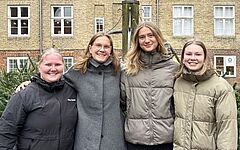
Four young volunteers from Denmark, all women, took part in a course in Christiansfeld (Jutland) over the last few days to prepare for their departure to Tanzania and their six-month service at the Moravian Church's Peter's House orphanage in Sumbawanga (Rukwa Province): Julie Kousgaard Madsen from Nexø on Bornholm, Anna Grønhøj Kristensen from Give, Julie Amby Reuss Damgaard from Skjern, and Julie Holm Skafsgaard from Stjær, west of Aarhus. They plan to arrive at their destination on January 15, 2026. Picture here. The mission organization of the Moravian Church in Denmark, BDM, has its own youth organization, primarily for current and former young volunteers, BDM’s unge.The young people active here meet three to four times a year to discuss the situation of the Moravian mission in Africa, especially the mission in Tanzania. In doing so, they motivate and inspire each other.
Letter from the Moravian Church in Tanzania to all its members
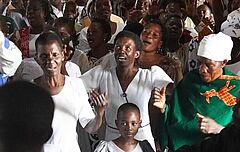
“It was with sadness and shock that the Moravian Church in Tanzania, together with all the people of Tanzania, witnessed the dramatic events following the presidential elections on October 29, 2025.” This is how a letter from the Moravian Church in Tanzania, the umbrella organization of all Tanzanian provinces, begins to all members of the Moravian Church, combined with a call for special intercession for the country until Sunday, November 30, 2025. The letter was prompted by the nationwide violent clashes between police and demonstrators during the recent elections. The UN estimates that several hundred people were killed. The opposition even believes that over 1,000 people were killed in the elections, which were won by incumbent President Samia Suluhu Hassan of the ruling CCM (Party of the Revolution) with 98 percent of the votes cast. To the post from Denmark in German here.
Mary Kategile from Tanzania is now a "Doctor of Theology"
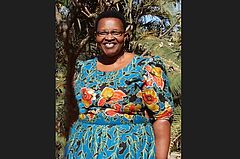
Mary Kategile, one of the best-known women in the worldwide Moravian Church, recently earned her doctorate (PhD) from the Open University of Tanzania. A pastor from the Tabora region in the Western Province of the Moravian Church in Tanzania, she has been a widow for many years and has seven children and grandchildren. She earned her bachelor's degree at the Moravian Theological College MoTheCo)in Tanzania and her master's degree at the Moravian Seminary in Bethlehem, Pennsylvania. A pioneer in women's and human rights work in the Moravian Church in Tanzania, she serves as general secretary of the Moravian Church in Tanzania, the coordinating body for all twelve Unity and Mission Provinces in Tanzania, and as a lecturer at Theofilo Kisanju University of the Moravian Church in Mbeya. Mary Kategile's dissertation is entitled: “An Investigation of the Socially Influenced Role and Leadership Competence of African Women in the Church: A Case Study in the Moravian Church and the Lutheran Church in Mbeya.” More here.
Introducing: Neema Abson Mwakapakula, Director of "Peter's House"
In a post dated November 14, 2025, the mission organization of the Moravian Church in Denmark, BDM, introduces Neema Abson Mwakapakula, the director of Peter's House, an orphanage run by the Moravian Church in Sumbawanga (Tanzania, Rukwa Province). See here. The director writes: "I myself grew up in difficult circumstances. My mother died when I was five years old. I became a domestic worker for a man who took advantage of me. Although I was still very young, I had to do all the housework. I really struggled to juggle everything: school and housework. Today, I want to help children in similar situations.“ Her main thesis is: ”Children need love to thrive. If a child doesn't want to go to school, it's usually because there are problems there. We therefore need to ask what the problem is and listen to the child. The child needs to gain enough self-confidence."
Electoral synod in Tanzania's South West Province
On October 23, 2025, during a synod of the Southwestern Province of the Moravian Church in Tanzania, one of the largest Unity Provinces worldwide in terms of membership, a new church leadership was elected. Paul Mwambalaswa was elected Chair Man as the successor to Robert Pangani, who previously held a dual office and can now concentrate on his episcopal duties. The election of Agnes Njeyo as Vice Chair Woman of the province is something special. She is the first woman in the Tanzanian Moravian Church to hold such an office. Agnes Njeyo initially led the women's work of the Southwest Province for many years before becoming involved in vocational training for the Moravian Church, serving as chairperson in two church districts and also working as a lecturer at the Moravian Church's Teofilo Kisanji University in Mbeya. Paul Mwambalaswa was previously the secretary of the province's stewardship department, where he was responsible for organizing training courses and seminars on Christian stewardship. More here.
Situation in Tanzania remains tense
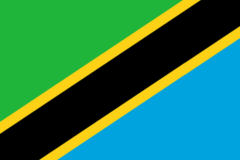
The presidential elections on October 29, 2025, led to a wave of violence in Tanzania, mainly on the part of the security forces. Even before the election, the election of President Samia Suluhu Hassan could be described as neither free nor democratic. The largest opposition party was excluded from the election and its leader was imprisoned. The alleged election result of almost 98% for the incumbent then proved to be the last straw. Many people demonstrated against the increasingly authoritarian behavior of the ruling party. Only by shutting down the internet and using violent force against the demonstrators was the government able to survive. Current information from Tanzania is available from Mission 21 or the Leipziger Missionswerk, for example. We ask for your prayers for the people of Tanzania.
Fundraising service at the Kipunguni Moravian Church
The Kipunguni Moravian Church, located in a young, informal district of Dar es Salaam – six kilometers southwest of Julius Nyrere Airport – still does not have a proper church building. Until now, the congregation has been meeting in a temporary church. To bring this temporary situation to an end, another fundraising service was held on October 12, 2025. Pictures here. A video here. During this service, Ndisechele Protas and Nsyani E. J. Atahudumu spoke about the details of the planned construction project. The sermon was based on the Bible verse Haggai 2:8-9: “The silver is mine, and the gold is mine, says the Lord of hosts. The glory of this new house shall be greater than the glory of the former house, says the Lord of hosts; and in this place I will give peace, says the Lord of hosts.” There was also joyful singing and confident prayer. Many pictures here and here.
“Goodbye, Kipili! Hello, Mwanza!”
Janice and Mads Jakobsen, the Danish missionary couple who worked for seven years in the Rukwa Province of the Moravian Church in Tanzania (mainly in Kipili and Sumbawanga), arrived at their new place of work in Mwanza in Lake Tanganyika Province on October 17, 2025, after a three-day drive. In a newsletter, they report on the warm welcome they received in the big city on Lake Victoria. Pastor Mlewa, the district pastor of the Moravian Church in Mwanza, and his wife visited Janice and Mads in their newly renovated house on the evening of their arrival and welcomed them. During their first week of service, the couple was shown several Moravian congregations, giving them an insight into local church life. The newsletter also mentions the farewell party in Kipili. Last Sunday in Rukwa Province, the leadership of Rukwa Province came from Sumbawanga to thank and bless the missionaries in a church service. From the end of December 2025 to the beginning of February 2026, the missionaries will be on home leave in Europe. More in a blog post by the Broedremenighedens Danske Mission here.
Iringa hosted the Sisters' Conference
On the weekend of September 12-14, 2025, a sisters' conference of the Moravian Church took place in Iringa in central Tanzania. Women from eight provinces, including the two new mission provinces of Ruvuma and Iringa, took part in this event. Bishop Robert Pangani, his wife, Pastor Bahati, and their daughter Demetria send their greetings with photos from the conference. See here. On July 18, 2025, the Moravian Mwangaza Academy was officially opened in Iringa. Robert Pangani praised this event. The German Göbel family, who supported the project through the Fly and Help Foundation, were also present. The academy is an important step towards enabling the church in the region to offer high-quality education. In addition to the Herrnhuter Missionshilfe, the project is supported by Tanzania Mwangaza, a local NGO committed to holistic education and development. See here and here.
A portrait of Nivard Gaudence, driver at the Kipili mission station
The mission organization of the Moravian Church in Denmark (BDM) recently profiled Nivard Gaudence, driver at the Kipili mission station in the Rukwa province of the Moravian Church in Tanzania. In the article by Svend Løbner, it says: "Nivard is the missionaries' right-hand man. Knud Elmo Knudsen said of him: ‘The most loyal employee I have ever had!’ He is a missionary when he drives, he coordinates the work and fills in the gaps when there are problems. When he finished 7th grade, his mother could no longer pay the school fees. When she fell ill, he moved in with his grandmother. His mother's illness worsened and she eventually died. This is how Nivard came to the carpentry school in Kipili, set up by missionary Knud Elmo Knudsen, and soon to the carpentry school in Kilangala. Later, Nivard, now a husband and father of four, worked as an assistant teacher and as a “jack of all trades” for the mission. He also took care of the young volunteers from Denmark." More in Danish here.
Course for evangelists in Kigoma: “Courage for entrepreneurship”
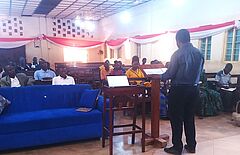
After more than 50 male evangelists and a few female evangelists from the Moravian Church in Tanzania (Lake Tanganyika Province) attended a week-long training course in Kigoma, they were sent out on Sunday to church services in the surrounding area. Their task was to demonstrate what they had learned during the course. This time, the course content did not focus primarily on preaching and pastoral care, but on very practical matters: How can I start a small business to secure my livelihood or help others to do so? How can I best handle the administrative work that arises in a company and in a congregation? How can I use my time responsibly? How can I ensure order and safety on company and church premises? With regard to running a small business, the evangelists were instructed in the production of juice and soap. More in Danish in an article by Svend Løbner here.
Pastors in Rukwa Province learn about cross-border mission
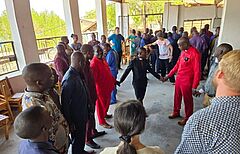
93 pastors from the Moravian Church in Tanzania's Rukwa Province recently took part in a seminar on ‘Cross-Border Mission.’ Janica and Mads Jakobsen from the Moravian Church's mission organisation in Denmark reported on this in their latest newsletter. The pastors were encouraged to also reach out to refugees and migrant workers, not least the Chinese, who are involved in many large construction projects in Tanzania. Africa is the continent with the highest percentage of Christians in the world, while Asia has the lowest percentage. This presents a challenge for Africans. A cross-cultural mission also belongs in large African cities. The seminar, which used various games and simulations, was led by Richard and Louisa Evans from All Nations Christian College north of London. More here.
Women's sermon in the Moravian Church at the airport in Sumbawanga
June 22, 2025, was a day of great joy in the Moravian Church at the airport in Sumbawanga, Tanzania, Rukwa Province. Loud choir singing rang out in an overflowing church during a service lasting several hours, followed by an auction to raise funds for a new church building. On this Sunday, women were celebrated in the church and throughout the country. Pastor Emeristo Ntangale therefore asked the assistant pastor, Helena Siame, to take over the sermon. For more than an hour, she preached on the Book of Esther, about a woman who saved her people from destruction through humility and wisdom. She emphasized that women should dare to speak their minds and act courageously, and that men should give women freedom and work together with them. Svend Løbner, public relations officer for the Herrnhut Mission in Denmark, is currently on a business trip to Kipili, Sumbawanga, and Mpanda in the Rukwa and Western provinces. Video here.
Experience in Kipili: “The patriarchal system is creaking at the seams”
Learning from the relationship stories in the Bible was the focus of another marriage seminar held by the Moravian Church in Kipili (Rukwa Province), Tanzania, which was attended by 30 married couples. The seminar was led by Janice and Mads Jakobsen, who were sent by the Moravian Church in Denmark. The seminar was very different from previous ones, where the men walked ten meters ahead of their wives and men and women sat on opposite sides of the church. During the seminar breaks, many couples walked close together, talked to each other, and even touched each other. Good marriages strengthen not only the family but also the congregation, the missionaries said. The married couples learned that when the Bible says that woman was created from man's rib, it does not devalue women, because ribs hold the upper body together. Without ribs, no one can stand upright. Just as men cannot do without their rib cage, they cannot do without the skills of women. In Kipili, it became clear that the patriarchal structure is creaking. More in Danish here.
The gospel comes to northern Tanzania on three wheels
The Gospel is now rolling on three wheels around the city of Mwanza in the northern province of the Moravian Church in Tanzania." This is what Danish missionary Bettina Poulsen writes about the cargo motorcycle that travels to several villages with the Jesus film and the accompanying image, sound, and stage technology. In May 2025, when there was a movie night in another region, everything went perfectly. On the day of arrival, which was actually only intended to test the equipment, about 60 people gathered spontaneously. They listened to the music and watched as the screen was set up. Later, on three evenings announced in advance under the theme Gospel on Wheels, between 150 and 200 people gathered in the villages. Before the film screenings, there is always choir singing and dancing by local Christians to attract attention and create a cheerful and welcoming atmosphere." More in a report by the Moravian Church's mission organization in Denmark here.
Friends of the Mühlacker church district launch volunteer program with the Moravian Church in Tanzania
On March 5, Bishop Robert Pangani, President of the Moravian Church Tanzania South West Province, and Michael Gutekunst, Chairman of the Association for the Support of the Partnership with the Moravian Church in Southwest Tanzania, signed a cooperation agreement for a new volunteer program. “Together, we can enable young people to experience voluntary service in another country, in another culture. In this way, we share faith and life together,” says Michael Gutekunst, delighted with the joint venture. The Evangelical Church District of Mühlacker and the Moravian Church in Tanzania have enjoyed a lively partnership for over 40 years. The support association was founded four years ago to develop a volunteer program, among other things. In cooperation with the Diakonisches Werk Württemberg, the Weltwärts Program enabled Tanzanian young adults to do voluntary service in southern Germany. At the same time, thanks to the association, several young Germans traveled to Tanzania to provide support and gain lasting experience. To the complete message here.
New videos of the Moravian Church's work in Mwanza, Kipili and Sikonge
The missionary couple Bettina and Morten Poulsen, sent out with their two children by Brødremenighedens Danske Mission. They recently published new video scenes. See here (200 seconds). The scenes are intended as a report on the work of the Moravian Church in Mwanza, Kipili and Sikonge, which has been going on for many years with support from Denmark. The scenes are intended for screening at the mission festival in Christiansfeld/DK and as a film full of thanks. The video scenes show very simple churches of the Moravian Church, which look more like a tin shed, but also beautiful new churches and schools that are under construction and almost finished. In any case, they show the commitment of the brothers and sisters there. In Mwanza and in the area around Lake Victoria, the Moravian Church is still a very young church.
Numerous pictures of the bishop's blessing in Mbeya
Bishop Joachim Kreusel, Ockbrook/GB, writes from Mbeya, the headquarters of the Southwest Province of the Moravian Church in Tanzania. "The consecration of Robert Pangani as a Bishop of the Moravian Church took place on Sunday, 2 June 2024, on the grounds of the Moravian Church's Teofilo Kisanji University in Mbeya. Robert Pangani and his wife Bahati as well as Demetria, Amani, Haruni and Placseda, the couple's children, send you their warmest greetings and thank you for all your love and faithful intercession. Here are some impressions of the six-hour service in Mbeya. See here (please scroll down!). Bishop Ezekiel Yona, another Moravian bishop in Tanzania, preached about Joshua, the successor of Moses, and God's word to him: 'As I was with Moses, so I will be with you. I will never leave you nor forsake you' (Joshua 1:5). The Deputy Prime Minister of Tanzania, Dr Doto Biteko, conveyed the government's greetings and called on Tanzanians to maintain peace, unity and love and never be divided for any reason. In one photo, the new bishop is wearing a Rongmei Naga Scarf, a gift from the Moravian Church of Binnakandi in the Indian state of Assam, as a sign of unity across continents."
From a sustainable forest project in the Sikonge region
The workshop at the Moravian Church's Sikonge Mission Hospital in Tanzania (Western Province) has received various tools with the support of the Moravian Church's mission organisation in Denmark (BDM) so that it can now start logging. The number of such orders is increasing. Felling trees seems to be very problematic at first, but in fact it is a sustainable project. In Tanzania, wood is considered a climate-friendly resource compared to steel and concrete, which otherwise dominate construction. The felling of trees is often regulated in Tanzania. It requires a state licence with which only trees of a certain type and size may be felled. The licences are only issued for wild forest areas that are dormant after logging and can regenerate sufficiently. Unfortunately, ordinary people in Tanzania often buy illegal timber, which is cheaper. In addition, there are many monopolists in the timber trade who artificially drive up the price of timber. If the hospital workshop in Sikonge offers people in the region legal wood at a favourable price, this helps the environment. This information was sent by Michael and Mia and Toldam Korsgård (DK), who have been working on behalf of the mission in Sikonge for two years.
Education
Tanzania, like other countries in Africa, lags far behind on the path to equal opportunity and quality education. Educational opportunities are strongly dependent on place of residence and income: Children and young people in rural areas are less likely to complete school than their peers in urban areas. The poorer the population, the poorer the chances of graduating from school. Compulsory schooling fails because of money. In most developing countries, the budget for education in the state budget is too small to cover the need. In addition, high national debts, poor governance, corruption and a lack of management and organizational skills hinder the provision of universal, high-quality education.
Project Pictures
With our mission to promote education, we as Herrnhuter Missionshilfe are countering this by gradually implementing a broad-based program with our partners to promote School Education, vocational training and study for young people in Africa and in Tanzania. Currently, Herrnhuter Missionshilfe supports 13 school institutions in Tanzania, including 3 secondary schools and 10 vocational training centers.
School education and vocational training are very important in Africa. A school degree enables a sound education, which opens the door to the job market or to independence and offers the chance to earn one's own living and to live self-determined.
For this reason, Herrnhuter Missionshilfe supports several Vocational Training Centers in Tanzania, whose impact is sustainable. "It is important to us not to leave the students alone after they finish school," says Rev. Raimund Hertzsch, chairperson of HMH. "We want to be able to offer our school leavers an apprenticeship and thus show them a way out of poverty. That's why our school principals work closely with the surrounding businesses. There's no point in providing students with qualified training and then offering them no prospects."
In order to enable children and young people from poor families and orphans to attend school or vocational training, we support them with various forms of assistance (sponsorships&scholarships) to give them the prospect of a self-determined life.
Health
The human right to the highest attainable standard of physical and mental health was formulated by the UN (United Nations) in 1966. It includes the safe and timely availability and accessibility of good quality health services to ensure basic care for major diseases. However, due to socio-political and economic conditions, many people in Africa still do not have access to modern medicine. Injustice and disadvantage are a reality. Especially in rural regions, there is a lack of good health facilities. Health work, strengthening health systems and improving the supply of medicines have been identified as core areas of work for Herrnhuter Missionshilfe. For example, health care facilities have been established in areas with poor transportation so that the population can receive basic medical care such as treatment for acute illnesses or education (AIDS/HIV) when needed.
The Herrnhuter Missionshilfe is strongly committed to health in cooperation with foundations and local organizations. It supports hospitals in Isoko and Mbozi as well as nursing schools where midwives, nurses and orderlies are trained. Pharmacies and access to medical equipment and medicines are also supported. Education and prevention are further important measures to contain diseases and to learn how to deal with them. The facilities supported by Herrnhuter Missionshilfe are repeatedly faced with the major challenge of having to procure or modernize medical equipment, renovate the buildings or adapt premises.
Project Pictures
News from the projects
The Johann Wavenza Nursing and Midwifery Institute in Mbozi
The Mbozi Province of the Moravian Church in southwestern Tanzania is one of the youngest provinces of the worldwide Moravian Church, although its beginnings date back to the 19th century and the Niesky pioneer missionary Traugott Bachmann (1865–1948). On July 7, 2025, the province proudly presented one of its facilities on Facebook: the Johann Wavenza Nursing and Midwifery Institute in Mbozi, Songwe Region. Some current pictures can be found here. The institute, which was founded in 1995, offers certificate and diploma courses in nursing and midwifery to a high standard. The institute's mission statement reads: “We are one of the country's leading training institutes in the field of health care and related sciences. We strive for excellence in education, research, practice, and service.” The institute is named after Johann Lukas Wavenza, who was elected the first bishop of the newly formed Southwestern Province of the Moravian Church in Tanzania in 1982. More about him here.
Medicine dispensing in good hands with Ibrahim Mahimbali
The mission organisation of the Moravian Church in Denmark BDM presents the Tanzanian pharmacist Ibrahim Mahimbali, who looks after the pharmacy at Sikonge Hospital, in an online article. See in Danish here. The employee, who was hired three years ago, ensures that the necessary medication is ordered in Dar es Salaam in good time and is always in stock at the hospital in the Western Province of the Moravian Church in Tanzania. The pharmacy is also used by external people and institutions, even by a state hospital. The pharmacist says: ‘I most frequently dispense antibiotics for inflammation, followed by diabetes medication and tablets for high blood pressure. I trained as a pharmacist for two years, and I still have two years of further training ahead of me. The pharmacy used to have a lot of debt, but now it's in balance.’ The pharmacy is located in the centre of the hospital grounds. Sikonge Hospital serves a population of 210,000 people.
sustainable Agriculture & planting Trees
Herrnhuter Missionshilfe is also active in the areas of environment and agriculture in Africa. Among other things, it supports tree planting projects in Sumbawanga, a farming project at Mbozi High School, and several projects in the area of sustainable agriculture. It thus supports the sustainable use of natural resources. Especially in times of climate change, such projects have a very high priority. The ultimate goal is to protect nature and the environment and to find alternatives. Together with its partners, Herrnhuter Missionshilfe is working specifically to promote and support more and more environmental projects.
"The best time to plant a tree was twenty years ago. The next best time is now."
Proverb from Uganda
Project video (german subtitles)
Example: Sumbawanga tree planting campaign
"My children are already very excited," Happy Mshani tells us. "They have never planted a little tree in their lives." Happy Mshani is a member of the tree planting group in Sumbawanga.
In total, about 70,000 different seedlings of several tree species were planted in this long-term ecological project. The seedlings were purchased from a regional tree nursery and then planted by a large number of community members. The actual planting action was preceded by making the necessary planting holes, including fertilizing the holes. The new planting area is about 400,000 square feet.
"We mainly used avocado trees and pine trees. The rainy season started later than usual. But our patience has paid off," reports Erord Simae, chairperson of the provincial board of Rukwa Province. "It will be a few more years before we can cut the first wood and harvest the first fruits," Simae says: "But the first step toward a sustainable future has been taken - we thank you for your help." Some of the fruit is sold at regional markets and contributes to the congregation's income generation. The congregation has set aside an extra area for each type of tree in the two-hectare area.
Project Pictures
News from the projects
Project Managers and Project Partners
Bettina Nasgowitz | Markus Kuhn |
| Tel. +49 (0)7164 9421-22 bettina.nasgowitz@ebu.de | Tel. +49 (0)7164 9421-23 markus.kuhn@ebu.de |
in cooperation with
Moravian Church Tanzania
Solar Projects
Most people in Africa suffer from power supply problems. Today, Africa is still a continent where electricity is far from being available everywhere or where there are frequent interruptions in the power supply. This clearly hinders economic development. Satisfying the growing demand for energy is an enormous challenge in all African countries. The most common source of energy continues to be conventional biomass. This is used ubiquitously for cooking. Fossil fuels dominate in the areas of power generation and transport.
Together with its local partners, Herrnhuter Missionshilfe is examining exactly where environmental projects can be usefully implemented. Above all, the expansion of solar power systems plays a major role here due to the insecure and unstable power supply. Through the sustainable use of natural resources, people benefit in the long term and are no longer completely dependent on the general power supply.
A solar-powered water pump has already been installed at the hospital in Mbozi. The goal is to equip all Moravian secondary schools and vocational training centers in the country with solar systems as well. It is important that the students and teachers themselves are able to carry out minor maintenance work on the systems themselves thanks to education and training. A functioning power grid is the basic supply for effective learning.
Project Pictures
completed project in Ibaba: project video (german)
Target groups
The target groups are families in the vicinity of the respective projects. Through the sustainable use of natural resources, people benefit in the long term and are no longer completely dependent on the general power supply.
Project goals
- Expansion and upgrading of solar systems to be used in further projects of Herrnhuter Missionshilfe
- Sustainable protection for the environment
- More independence from the state power supply
Activities
Installation of solar power systems for sustainable, off-grid power supply in schools and hospitals
Project progress
Herrnhuter Missionshilfe is currently examining where exactly further environmental projects can be usefully implemented. Especially the expansion of solar plants plays a major role due to the insecure and unstable power supply.
Currently, the construction of a solar plant and a solar-powered water pump in the Mbozi Hospital is in the planning stage.
News from the projects
Project Managers and Project Partners
Bettina Nasgowitz | Markus Kuhn |
| Tel. +49 (0)7164 9421-22 bettina.nasgowitz@ebu.de | Tel. +49 (0)7164 9421-23 markus.kuhn@ebu.de |
in cooperation with
Moravian Church Tanzania
Women
Hard work, domestic violence and oppression, HIV infection - everyday life is hard for many women in Tanzania. But there is hope for them: The women's center in Rungwe.
It has an excellent reputation, so many women take long walks to get to the center. Together, they talk about their daily lives, help each other and give each other comfort. They are informed about their rights by professionals. The sewing group Pamoja Tunaweza ("Together we can do it") provides work, compensation, independence and a small income of their own.
The women sew, for example, laptop bags, cell phone cases, cuddly toys, backpacks, tote bags and cosmetic bags. These are sold at regional markets and to Germany and Switzerland. The fair trade company of Herrnhuter Missionshilfe, Moravian Merchandise, has had these goods in its assortment for years.
In the women's group they also inform themselves about treatment options with regard to HIV infection or AIDS. Here their hope grows and here they get support. And the watchwords in Swahili also play a major role in this. The watchwords are an important building block, and the women in the congregations are proud of the fact that they usually receive them before the pastors in their congregations.
Project Pictures
Video: Wir können es! Frauenpower in Rungwe
Sponsorships and Scholarships
Information on Sponsorships and Scholarship programs also in Tanzania can be found under the heading Sponsorships&Scholarships.
Video: Einsatz für Waisen und benachteiligte Kinder in Mbeya (german)
In our online shop Moravian Merchandise you can get fair trade vanilla, sewing, coffee and more from Tanzania. Furthermore you will find spices like pepper, curry, ground chilies (Pilli-Pilli) from Zanzibar.
Besides these spices we offer products from projects and partner organizations worldwide, e.g. olive oil from Palestine.
Moravian Merchandise helps people in different countries of the world to earn a fair income and thus creates hope.
